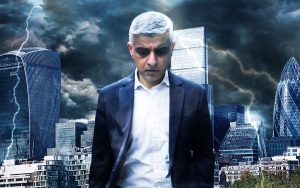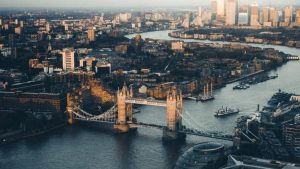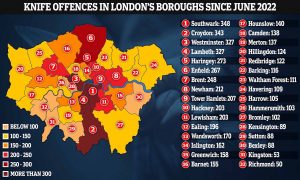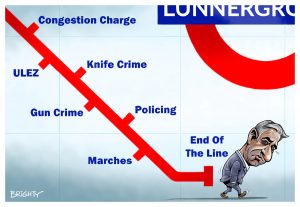
As the sun dipped down below the skyline, casting long shadows over the bustling streets of London, on Thursday night, a palpable sense of unease hung in the air. It’s a city in flux, where the echoes of sirens punctuate the rhythm of urban life and the glow of street lights offers little solace to weary residents. Against this backdrop of uncertainty, the mayoral elections loomed large, casting a spotlight on the shambolic reign of Sadiq Khan.

In the heart of the metropolis, commuters shuffle wearily through crowded stations, their faces etched with the strain of navigating a city gripped by crisis.
Amidst the throng, voices murmur discontent, trading tales of rising crime and punitive policies that threaten to squeeze the life out of London’s vibrant communities.
Above the fray, billboards plastered with promises of change serve as a stark reminder of the stakes at hand. For many, the prospect of another term under Khan’s leadership elicits a collective sigh of resignation, a resignation born not of acceptance, but of disillusionment with a mayor who has failed to deliver on his mandate.
Against this backdrop of simmering discontent, the stage is set for a reckoning. As voters prepared to cast their ballots, the specter of Khan’s tenure looms large, casting a long shadow over the future of London. It is within this crucible of uncertainty that the true measure of his legacy will be weighed, a legacy marred by broken promises, misplaced priorities, and a city left longing for change.
Let us just remind ourselves of this little man with his oversized ego who made TFL almost bankrupt, and how he has turned our capital city into the black hole of Calcutta.
Knife Crime Epidemic:
Knife crime has plagued London under Sadiq Khan’s leadership, with statistics painting a grim picture of the city’s safety. From 2016 to 2020, there was a staggering 32% increase in knife offences. This surge in violence has left communities reeling, and families mourning loved ones lost to senseless acts of brutality. Despite promises to tackle the issue, Khan’s strategies have fallen short, failing to address root causes and provide effective solutions. Instead, Londoners continue to grapple with the fear of violence lurking in their neighbourhoods, underscoring the urgent need for decisive action.
This surge in violence has left communities reeling, and families mourning loved ones lost to senseless acts of brutality. Despite promises to tackle the issue, Khan’s strategies have fallen short, failing to address root causes and provide effective solutions. Instead, Londoners continue to grapple with the fear of violence lurking in their neighbourhoods, underscoring the urgent need for decisive action.
Toxic Traffic Policies:
Sadiq Khan’s implementation of the ULEZ charge has compounded the challenges facing Londoners, particularly motorists and small businesses. Designed to reduce air pollution, this congestion charge targets drivers of older, more polluting vehicles. While the intention may be noble, the reality is a burden placed disproportionately on those who can least afford it. For many, the daily commute has become a financial strain, with additional costs imposed just to navigate the city they call home. Khan’s failure to consider the ramifications of such policies highlights a disconnect between leadership and the lived experiences of ordinary citizens.
Arrogance and Incompetence:
Throughout his tenure, Sadiq Khan has been accused of exhibiting arrogance and “small man syndrome,” traits unbecoming of a leader entrusted with the welfare of millions. From dismissive remarks to thinly veiled jabs at political opponents, Khan’s conduct has often overshadowed his governance. Rather than prioritising the needs of Londoners, his actions seem driven by personal agendas and political posturing.  This arrogance has not only alienated constituents but also hindered progress on critical issues facing the city. In the face of mounting challenges, Khan’s leadership style appears increasingly out of touch, raising questions about his suitability to lead London into a brighter future.
This arrogance has not only alienated constituents but also hindered progress on critical issues facing the city. In the face of mounting challenges, Khan’s leadership style appears increasingly out of touch, raising questions about his suitability to lead London into a brighter future.
These points collectively paint a damning picture of Sadiq Khan’s mayoral reign, underscoring the pressing need for change in London’s leadership. Let us hope today he is finally kicked out of office.